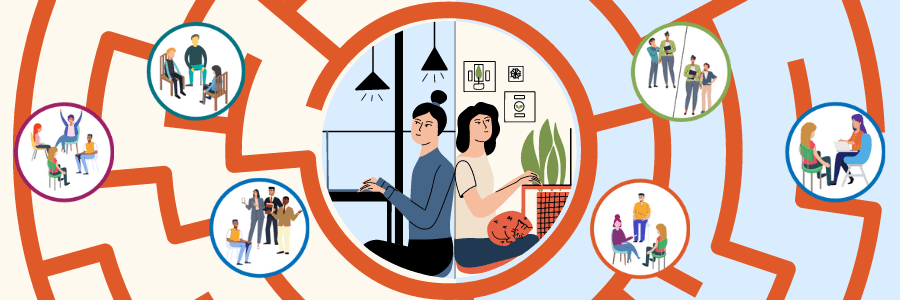
Exploring the Diverse Landscape of Mentoring Programs in the Hybrid Workplace
In my February 2023 blog, we discussed the significance of workplace mentoring programs and their impact on organizational success in 2023. As we continue our exploration, it is crucial to understand the different types of mentoring programs available and how to determine the right kind for your workplace. In this blog, I will delve into the various mentoring program options, highlight their benefits, and provide guidance on implementing them effectively. With the increasing prevalence of hybrid workplaces, where remote and in-person collaboration coexist, choosing the appropriate mentoring approach becomes even more critical to foster belonging, skill development, leadership, career growth, networking, knowledge transfer, and problem-solving.
Traditional One-to-One Mentoring
The most common and well-known form of mentoring is the traditional one-to-one model, where an experienced professional mentors an individual with less experience. This type of mentoring is ideal for learning and development, career growth, and networking opportunities. The mentee receives personalized guidance, support, and knowledge transfer, while the mentor gains satisfaction from sharing their expertise and helping someone progress in their career.
Reverse Mentoring
Reverse mentoring flips the traditional mentoring dynamic, with a less experienced individual mentoring someone more senior or older. This approach allows for the sharing of specific expertise and provides alternative perspectives in the workplace. Reverse mentoring is particularly effective in bridging generational gaps, fostering mutual learning, and promoting diversity of thought.
Peer-to-Peer Mentoring or Co-Mentoring
Peer-to-peer mentoring occurs when individuals with similar roles or experiences support and guide each other. This approach enables participants to share lived experiences, build strong social support networks, and foster collaboration within the organization. Co-mentoring provides a valuable platform for peer learning, enhancing teamwork, and addressing common challenges collectively.
Multiple One-to-One Mentoring Relationships
In this model, a single mentor supports two separate mentees individually, without the mentees interacting as a group. This approach offers mentorship for multiple individuals while still maintaining the personalized attention and guidance associated with one-to-one mentoring. Multiple one-to-one mentoring relationships foster accelerated leadership development, facilitate knowledge transfer, and support career growth.
Mentoring Triads
A mentoring triad involves one mentor and two mentees who meet together instead of separately. This structure is particularly effective when mentors are scarce but multiple mentees could benefit from their guidance. Mentoring triads provide opportunities for peer learning, sharing experiences, and expanding mentees’ exposure to different perspectives and approaches.
Mentoring Cohorts (also known as Mentoring Circles)
In mentoring cohorts, one or two mentors engage with multiple mentees as a group. This approach is often utilized following learning and development programs or during post-merger integrations. Mentoring cohorts foster a sense of community, facilitate cultural integration, support knowledge sharing, and provide ongoing support for mentees within a structured group setting.
Peer Group Mentoring
Peer group mentoring involves a group of individuals who share similar experiences or challenges. While there may be a facilitator present, no specific mentor is assigned. Peer group mentoring provides a supportive environment for social connections, sharing learned experiences, and addressing common issues faced by participants. This approach is particularly beneficial for building a sense of camaraderie and providing mutual support.
Mentoring Incubators
In a mentoring incubator, a single mentee receives guidance and support from multiple mentors. This approach is highly effective for rapid career growth, developing ideas, or accelerating a business. By accessing a diverse range of expertise and perspectives, the mentee can achieve accelerated progress and expand their network significantly.
Determining the Right Mentoring Program for Your Workplace
To choose the most suitable mentoring program for your workplace, consider your organizational development goals. Determine whether your organization needs to foster a sense of belonging, provide training and skill development opportunities, identify and nurture future leaders, support career growth, facilitate networking, transfer knowledge, or encourage problem-solving. Each mentoring program type has its strengths, so selecting the one that aligns with your specific objectives is crucial.
During this process it is also important to take into consideration the capacity of your mentoring pool. How many experienced mentors do you have access to, how many mentee candidates are you hoping will participate. This will also help you to determine the best configuration for your workplace mentoring program.
Once you have identified the appropriate mentoring program, follow these steps to implement it effectively:
- Assess Organizational Readiness: Evaluate the organization’s readiness for a mentoring program, ensuring alignment with strategic goals, securing leadership support, and establishing the necessary resources.
- Define Program Objectives: Clearly articulate the objectives of the mentoring program, aligning them with the identified organizational development goals. Establish measurable outcomes to gauge program success.
- Structure and Guidelines: Develop a program structure, guidelines, and expectations for mentors and mentees. Define roles, responsibilities, meeting frequency, and duration of the mentoring relationships.
- Mentor Recruitment and Training: Recruit mentors who possess the necessary skills, expertise, and commitment. Provide mentor training to ensure they are equipped with the knowledge and tools to support their mentees effectively.
- Mentee Matching: Implement an unbiased matching process that considers mentee needs, goals, and preferences, as well as mentor expertise and availability. Utilize a mentor matching algorithm and platforms like Pollinate to streamline and optimize the matching process, facilitate the learning experience and measure the success of the program.
- Launch and Support: Launch the mentoring program with a kick-off and training event to engage participants and create enthusiasm. Provide ongoing support to mentors and mentees through check-ins, resources, and forums for sharing best practices.
- Program Evaluation: Regularly assess and evaluate the mentoring program’s effectiveness, collecting feedback from mentors and mentees. Track progress, measure outcomes, and make adjustments as needed to ensure continuous improvement.
In the ever-evolving landscape of hybrid workplaces, implementing the right mentoring program is essential for fostering growth, development, and collaboration. By considering the organizational development goals and the wide array of mentoring solutions available, organizations can create tailored programs that address specific needs. Whether it’s traditional one-to-one mentoring, reverse mentoring, peer-to-peer mentoring, mentoring cohorts, or other models, each approach offers unique benefits to enhance employee engagement, skill development, and organizational success. By following the implementation steps and leveraging mentoring technology platforms like Pollinate, organizations can design and launch impactful mentoring programs that unlock the full potential and productivity of their workforce.
Are you ready to design your tailored mentoring program? Reach out to us today and let us help you shape the future of mentorship in your organization!
Cindy Collins – Director, Client Delivery
Cindy Collins provides strategic and tactical day-to-day leadership to the client services operations and project management team at Pollinate Networks. With a mandate of fostering a collaborative approach in delivering exceptional client services, this role works closely with B2B clients to thoroughly understand their needs and to manage the fluid sharing of that knowledge throughout the implementation of mentoring, assessment and consultative initiatives. Cindy also contributes to the functional management of sales and marketing strategy for the organization.




